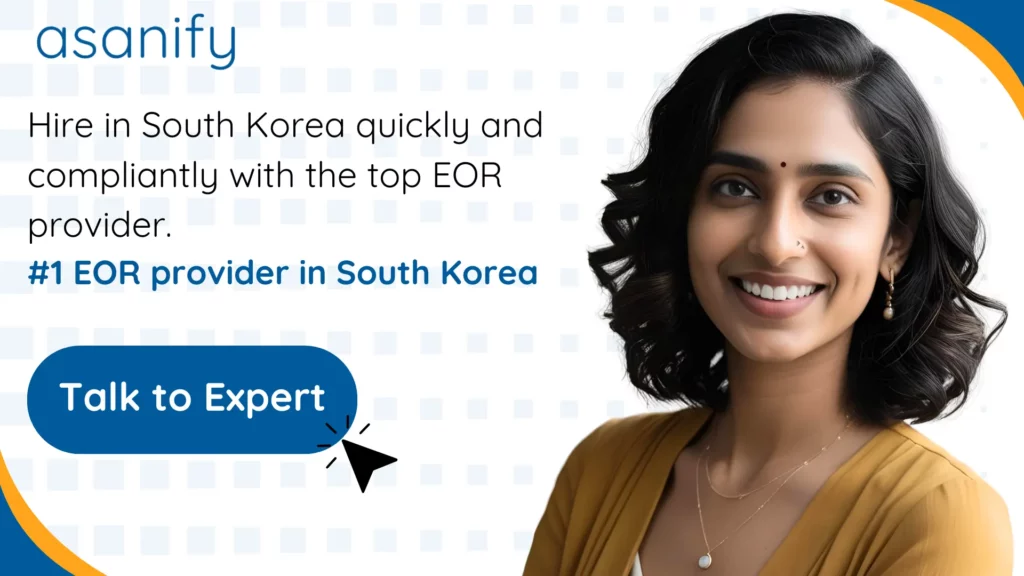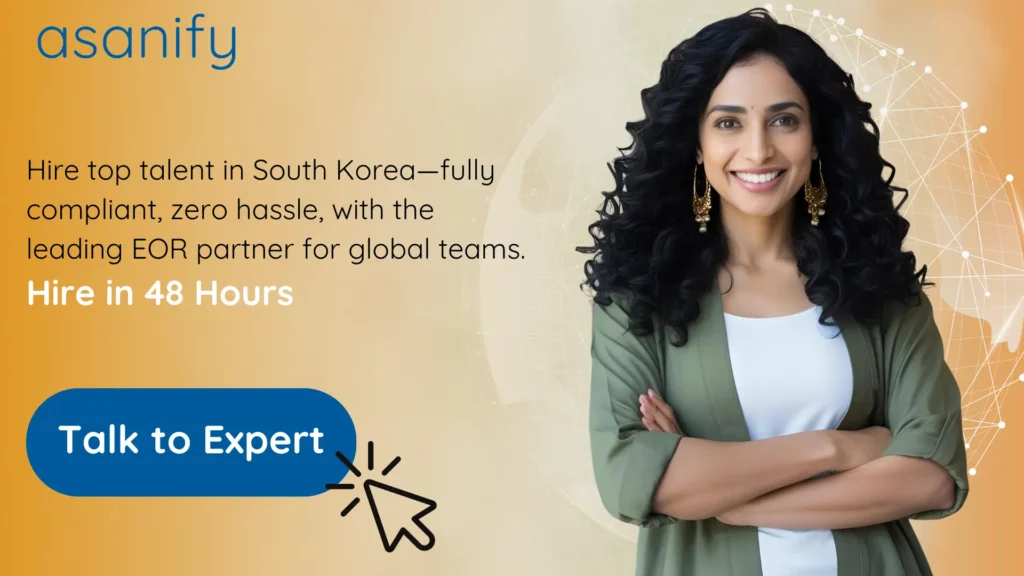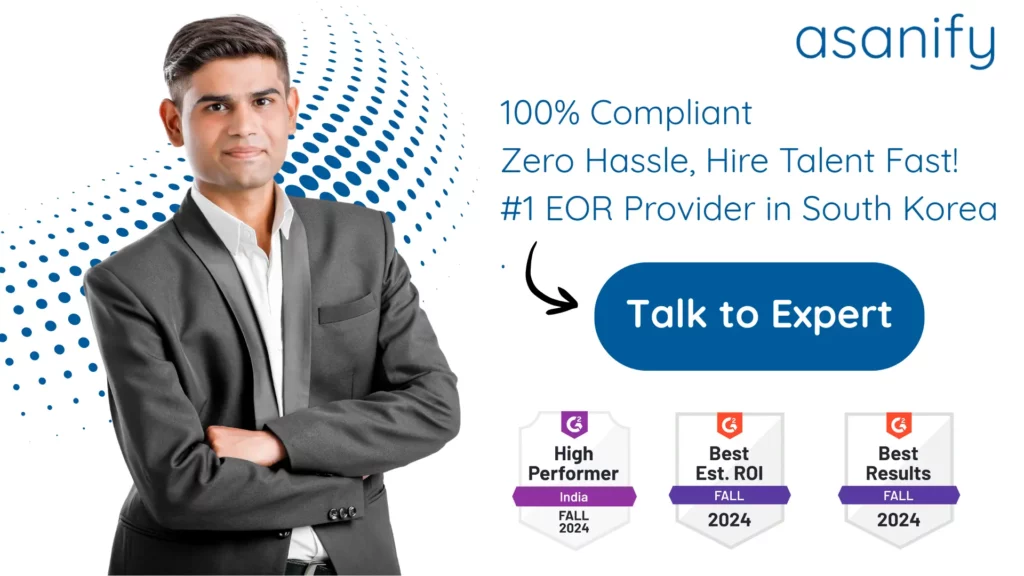As companies embrace global hiring in 2025, South Korea has emerged as a competitive and reliable destination for staff augmentation. With its advanced technology infrastructure, highly educated workforce, and strong regulatory frameworks, South Korea offers global firms the perfect environment to scale operations through flexible staffing models.
Whether you’re a startup looking to build an agile product team or an enterprise expanding into APAC, this guide helps you explore the top staff augmentation companies in South Korea—trusted partners to help you hire fast, stay compliant, and grow with confidence.
Table of Contents
- What is Staff Augmentation and Why is South Korea a Preferred Destination
- How Do Different Staff Augmentation Models Work in South Korea
- What Are the Key Benefits and Challenges of Staff Augmentation in South Korea
- How to Choose the Right Staff Augmentation Company in South Korea
- Top 10 Staff Augmentation Companies in South Korea
- What Are the Compliance and Legal Considerations for Staff Augmentation in South Korea
- How Can Asanify Support Your Staff Augmentation and Workforce Expansion Needs in South Korea
- FAQs
What is Staff Augmentation and Why is South Korea a Preferred Destination?
Staff augmentation is accelerating globally in 2025 as companies prioritize agile workforce models to meet evolving business needs. It offers a flexible, cost-effective alternative to traditional hiring—allowing businesses to quickly access specialized talent without the burden of long-term commitments or establishing a legal entity. South Korea is emerging as a premier destination for staff augmentation due to its tech-savvy talent pool, regulatory maturity, and strategic location in the Asia-Pacific region.
Definition and Concept
Staff augmentation is a dynamic workforce model that enables organizations to scale teams quickly by hiring external professionals—on a temporary or project-specific basis. These professionals may work remotely or onsite and are typically engaged to bridge talent gaps, support ongoing projects, or accelerate delivery timelines without undergoing complex recruitment cycles or incurring full-time employment costs.
Unlike traditional outsourcing—where entire functions or projects are managed externally—staff augmentation allows companies to maintain direct control over processes and team performance. Augmented staff operate as an extension of internal teams, aligning with company tools, timelines, and workflows. This hybrid approach is ideal for modern businesses that value agility, transparency, and cost control.
Key Features:
- On-demand access to skilled professionals in areas like software development, cybersecurity, digital design, finance, and customer support
- Flexible engagement options—ranging from a few weeks to multi-year assignments
- No need to establish a South Korean entity, lease office space, or onboard permanent employees
- Seamless integration with internal tools and systems (e.g., Jira, Trello, Notion, GitHub)
- Rapid hiring through pre-vetted talent pools and Employer of Record(EOR ) partners
The model is particularly popular among industries undergoing digital transformation—such as fintech, SaaS, mobility, gaming, logistics, and healthcare—where rapid scaling and niche expertise are critical.
Why Companies Prefer Staff Augmentation
In the fast-evolving economy of 2025, staff augmentation helps global companies remain competitive, compliant, and nimble. Key benefits include:
- Fast Hiring: Staff augmentation vendors in South Korea maintain ready-to-deploy talent rosters, enabling onboarding in as little as 5–10 business days.
- Access to Specialized Skills: From AI engineers and blockchain developers to UI/UX experts and data scientists, South Korea offers deep technical expertise not always easily found in other markets.
- Cost-Effective Scaling: Reduce overhead by avoiding long-term salary commitments, office leasing, or employee benefits—while still accessing top-tier talent.
- Agile Delivery Models: Scale up or down based on project sprints, product cycles, or testing new markets without restructuring internal teams.
- Time Zone and Regional Access: With favorable overlap across APAC and partial Europe/U.S. business hours, South Korea supports global product development with enhanced cross-regional collaboration.
Why South Korea is a Go-To Destination
South Korea has positioned itself as one of Asia’s most reliable and future-ready staff augmentation destinations. Its combination of digital innovation, education excellence, and globally-aligned labor standards make it ideal for companies expanding into Asia or augmenting their global teams.
Key Advantages:
- Digitally Native and Technically Skilled Workforce
South Korea is globally recognized for its world-class education in engineering, information technology, and sciences. The country ranks high in innovation, R&D intensity, and technical university output—producing skilled professionals across multiple disciplines. - Multilingual and Globally Oriented Talent
Korean professionals are increasingly fluent in English and familiar with international collaboration, making them well-suited for cross-border team environments and distributed work structures. - Mature Legal and Labor Frameworks
South Korea maintains robust labor protections, clearly defined contractor laws, and social insurance systems. It is aligned with international labor practices and offers a transparent business environment for foreign companies. - Strong IP Protection and Data Security
The country enforces advanced IP laws and is a signatory to key global treaties—making it a secure environment for hiring in R&D, software development, and innovation roles. - Strategic APAC Location
Situated between China and Japan, and well-connected to Southeast Asia, South Korea serves as a strategic base for companies targeting regional growth and time zone coverage across Asia-Pacific. - High-Speed Infrastructure and Digital Tools Adoption
With some of the fastest internet speeds globally and a high rate of digital adoption, South Korean professionals are adept at remote collaboration using platforms like Slack, Figma, Zoom, and Asana. - Pro-Business Ecosystem
Government initiatives to promote foreign investment, support for tech startups, and flexible work visa pathways make South Korea an increasingly attractive destination for global workforce expansion.
In conclusion, staff augmentation empowers companies to scale intelligently and build global teams without excessive risk or infrastructure burden. South Korea provides all the necessary ingredients—skilled talent, legal compliance, global readiness, and a future-facing tech environment—to support this model effectively. Whether you’re extending your development team or entering new Asian markets, South Korea is well-positioned to support your hiring goals in 2025 and beyond.
How Do Different Staff Augmentation Models Work in South Korea?
South Korea’s staff augmentation ecosystem is built to support a wide range of engagement models—from short-term project hires to long-term strategic team expansions. Companies can choose between onsite, offshore, or nearshore resources, while also benefiting from hybrid team setups and contract-to-hire flexibility. South Korean vendors are equipped to tailor deployments based on the specific technical, regulatory, and cultural needs of both regional and global businesses.
Onsite, Offshore, and Nearshore Models
- Onsite: Professionals work directly from your office in South Korea or are deployed at local client sites through visa sponsorship by a Korean staffing partner. This model is often used by enterprises with physical operations in Seoul, Busan, or Incheon.
- Offshore: Talent based outside South Korea—such as from the Philippines, India, or Vietnam—works remotely but is managed and contracted via Korean firms. This allows cost efficiency while maintaining Korean compliance standards through centralized oversight.
- Nearshore: Staff are sourced from other APAC countries with time zone proximity, such as Japan, Taiwan, or Singapore. This model helps businesses maintain regional operational coverage with minimal scheduling friction.
Korean vendors often support hybrid teams, blending offshore resources with onsite Korean team leads—achieving cost efficiency without compromising communication or delivery.
Dedicated Teams vs. Individual Contributors
Staff augmentation in South Korea supports both structured team formations and ad hoc, role-specific hiring:
- Dedicated Teams: These are cross-functional pods (developers, QA, designers, project leads) assembled to execute long-term projects such as product launches, app development, or enterprise software rollouts.
- Individual Contributors: Ideal for project-based needs such as database migration, cybersecurity audits, UI/UX redesign, or interim DevOps roles.
Both models offer flexibility, fast deployment, and full integration with the client’s internal teams and tools.
Short-Term vs. Long-Term Contracts
- Short-Term: Suitable for MVP development, seasonal surges, compliance reviews, or short-cycle feature rollouts. Typical duration ranges from 1 to 3 months.
- Long-Term: Used for consistent delivery in roles like full-stack development, QA automation, customer support, or long-term digital transformation initiatives. Contracts may range from 6 to 24+ months with performance KPIs.
Contract-to-Hire Options
Many South Korean augmentation providers offer contract-to-hire pathways, enabling businesses to assess cultural and performance fit before offering a permanent position.
- Reduces hiring risk
- Aligns with Korea’s structured employment protocols
- Smooth transition facilitated through compliant contracts and tax migration

What Are the Key Benefits and Challenges of Staff Augmentation in South Korea?
South Korea offers a unique blend of tech-savvy talent, legal stability, and regional strategic value for staff augmentation. It provides quick access to highly trained professionals across multiple verticals while allowing international companies to scale without the need to register a Korean entity. However, understanding labor law nuances, social insurance obligations, and cultural alignment is key to successful engagements.
Key Benefits
- Access to Highly Skilled and Educated Talent
South Korea consistently ranks among the top countries for STEM education, R&D investment, and digital readiness. Professionals are skilled in mobile app development, AI/ML, robotics, gaming, and enterprise software. - Reduced Time-to-Hire
Korean staff augmentation firms maintain pre-screened talent pools, enabling fast onboarding—often within 7–10 business days. - No Legal Entity Required
By partnering with an Employer of Record (EOR), companies can hire and pay Korean talent compliantly without setting up a branch or subsidiary. - Compliant Scaling Across APAC
Staff augmentation offers flexibility to test or expand in Asian markets, while Korean contracts ensure legal security. - Data Protection and IP Security
South Korea has comprehensive IP protection laws and data privacy frameworks (mirroring GDPR principles), making it ideal for tech and data-driven industries.
Common Challenges
- Higher Compensation Expectations
South Korea’s cost of talent may be higher than markets like India or Vietnam. However, this is balanced by high productivity and quality. - Complex Employment Regulations
South Korean labor law includes strict rules around severance pay, termination notice, and working hour limits. Non-compliance can result in disputes or penalties. - Social Insurance and Tax Compliance
Employers must manage contributions to Korea’s “Four Insurances”: health, national pension, employment, and worker’s compensation. Navigating this requires local expertise. - Language and Cultural Onboarding
While many professionals speak English, effective onboarding and engagement may require understanding Korean workplace etiquette and communication styles.
Suggested Read: Remote Employees Onboarding Checklist with EOR in South Korea
How to Choose the Right Staff Augmentation Company in South Korea
Choosing a staff augmentation provider in South Korea should be based on their compliance expertise, speed of hiring, and ability to navigate the local regulatory landscape. Look for partners with a proven track record in your industry, strong HR infrastructure, and knowledge of Korean labor, immigration, and data privacy laws.
Key Evaluation Criteria
- Industry Expertise: Ensure the partner understands your vertical—especially if you operate in SaaS, gaming, logistics, AI, or fintech.
- Hiring Agility: Time-to-hire should ideally be within 5–10 business days for in-demand tech roles.
- Talent Model: Understand whether they focus on local talent, offshore delivery centers, or a hybrid staffing strategy.
- Client Portfolio and Success Metrics: Look for documented success in managing APAC-based talent deployments.
Operational Capabilities
- Localized payroll and tax handling under Korean labor law
- Four Insurance scheme administration
- Contract templates with NDA, IP transfer, and Korean language compliance
- Real-time support for onboarding, performance tracking, and grievance management
- Support for visa processing if required for non-Korean residents
Questions to Ask
- Can you deploy talent in under 10 business days?
- How do you handle Korea’s Four Insurance programs and local tax filings?
- Do you offer bilingual contracts and onboarding documents?
- What experience do you have with APAC cross-border staffing?
- Do you provide contract-to-hire options or replacement guarantees?
Top 10 Staff Augmentation Companies in South Korea
South Korea is home to a dynamic mix of global recruiters, local staffing agencies, and specialized EOR platforms that support fast, compliant team expansion. Whether you’re scaling a product team in Seoul or adding remote tech talent across the APAC region, these top 10 staff augmentation companies provide the infrastructure, speed, and legal expertise to help you hire with confidence in 2025.
1. Asanify
A trusted Employer of Record and staff augmentation platform, Asanify enables global companies to legally hire in South Korea without setting up a local subsidiary. From payroll to NDAs, tax filings to benefits (like NHIS and pension), Asanify handles the full lifecycle with speed and compliance.
Key Features:
- 5–10 day onboarding timeline
- PDPA-compliant contracts
- Integrated payroll and HR dashboard
- Full lifecycle support
2. Catch People
Catch People is a South Korean talent platform focused on tech, game development, and digital design roles. It provides both staff augmentation and permanent hiring services, tailored for high-growth startups and media companies looking for skilled creatives and developers.
Key Features:
- Specialist focus on tech, gaming, and UI/UX roles
- Staff augmentation and direct hire flexibility
- Local compliance and fast matching
- Ideal for Korean startups and creative agencies
3. Rocket Punch
Rocket Punch is South Korea’s leading tech talent marketplace, enabling companies to hire developers, data scientists, and designers on a contract or full-time basis. Its user-friendly interface and strong candidate pool make it ideal for agile team expansion.
Key Features:
- Large talent pool of Korean tech professionals
- Flexible hiring models: full-time or project-based
- Popular with startups, SaaS, and eCommerce firms
- Strong employer branding tools built in
4. People & Work
People & Work offers EOR, temp staffing, and project-based hiring solutions for Korean startups and MNCs. With expertise in HR compliance, payroll management, and social contributions, it’s a reliable partner for legally sound talent deployment.
Key Features:
- Employer of Record (EOR) services in South Korea
- Handles NHIS, NPS, severance, and tax compliance
- Fast hiring for temp and contract roles
- Trusted by growing companies and regional brands

5. JobPlanet Outsourcing
An extension of Korea’s top job review platform, JobPlanet Outsourcing delivers staff augmentation solutions for IT, support, and product teams. Its platform-based insights help companies attract top talent while staying compliant.
Key Features:
- Specializes in customer support and IT roles
- Access to top-rated talent from JobPlanet ecosystem
- Transparent employer reviews aid better matching
- Supports payroll, documentation, and compliance
6. Robert Walters Korea
Robert Walters Korea is a global recruitment leader with strong presence in South Korea, offering contract staffing for mid-to-senior professionals across tech, legal, finance, and HR functions. Its network makes it ideal for bilingual and leadership hiring.
Key Features:
- Global expertise with Korean market focus
- Contract hiring for strategic roles
- Experienced in bilingual placements
- Strong track record in financial and legal domains
7. Manpower Korea
A part of ManpowerGroup, Manpower Korea provides staff augmentation, temp staffing, and workforce strategy services across IT, manufacturing, and administration. It supports both multinational and local firms scaling up or expanding in Korea.
Key Features:
- Full-spectrum staffing services
- Industry-specific augmentation (e.g., automotive, electronics)
- Legal compliance and payroll coverage
- Workforce planning and consulting add-ons
8. JAC Recruitment Korea
JAC Recruitment Korea specializes in placing bilingual professionals in mid-to-senior contract roles. Known for its focus on cultural fit and executive-level augmentation, it’s a preferred choice for roles requiring both Korean and English fluency.
Key Features:
- Bilingual and cross-border talent placement
- Contract and executive augmentation
- Deep sector experience in finance, supply chain, and HR
- Ideal for Korea-Japan or Korea-EU coordination teams
9. HRnetOne
HRnetOne is a pan-Asia recruitment firm with solid operations in South Korea, offering staff augmentation, contract hiring, and outsourced HR management. It serves high-growth industries like biotech, FMCG, and IT.
Key Features:
- Contract staffing for emerging and established sectors
- Strong APAC reach with Korean compliance expertise
- Offers RPO and professional HR advisory
- Flexible team scaling for short- and long-term projects
10. JobKorea Outsourcing
JobKorea Outsourcing supports staff augmentation across logistics, customer service, IT, and retail functions. With its reach across Seoul and nearby tech hubs, it helps fast-moving businesses ramp up their Korean presence.
Key Features:
- Augmentation for logistics, service, and tech teams
- Trusted by Korean corporates and foreign entrants
- Administrative and onboarding support
- Scalable workforce options for operational growth

What Are the Compliance and Legal Considerations for Staff Augmentation in South Korea?
When engaging in staff augmentation in South Korea, companies must comply with detailed labor regulations concerning employment classification, taxation, and social insurance. Clear differentiation between independent contractors and employees is critical to avoid legal risks and reclassification. Additionally, companies must ensure data privacy and intellectual property protection—particularly when working with remote, tech-based, or cross-border teams. Partnering with a South Korean Employer of Record (EOR) or a compliant staff augmentation vendor significantly reduces administrative burdens and legal exposure.
Worker Classification and Contracts
- Proper Classification Is Essential
Misclassifying a long-term contractor as an employee can result in legal penalties. Korean courts assess control, continuity, and dependency in such relationships. - Employment Contracts Must Align with Labor Standards Act
Contracts should clearly state terms of employment, include severance provisions, outline benefits, and comply with South Korea’s Labor Standards Act. - Visa Requirements for Foreign Talent
If hiring foreign nationals in South Korea, companies must sponsor proper work visas. Visa categories vary by role and duration (e.g., E-7 for skilled workers, D-8 for startups). - Dual-Language Contracts
Contracts should be written in both Korean and English when engaging foreign employees, especially for IP-sensitive or multinational assignments.
Payroll and Taxation
- Four Major Insurances
All employees must be enrolled in:- National Pension Service (NPS)
- National Health Insurance (NHI)
- Employment Insurance
- Industrial Accident Compensation Insurance
- Withholding Tax Obligations
Employers are responsible for deducting and filing income tax monthly with the National Tax Service (NTS), including year-end adjustments. - Severance Pay (퇴직금)
Korean law mandates one month’s wage per year of service for employees who work one year or longer. This is a legal obligation separate from monthly payroll. - Payroll Reporting and Payslip Requirements
Monthly payslips and payroll statements must be documented and provided to employees as part of standard labor compliance.
Intellectual Property and Data Security
- Strong IP Protections
South Korea enforces IP ownership through employment contracts and is a member of the Berne Convention and WTO TRIPS agreement. Contracts should clearly outline IP transfer and confidentiality clauses. - Data Privacy Laws
The Personal Information Protection Act (PIPA) is South Korea’s core data protection law, similar in scope to GDPR. Employers must adopt secure data practices when handling employee or project-related information.
Legal Support from Vendors
Top-tier South Korean staff augmentation providers and EORs typically handle:
- Drafting Bilingual Contracts (KR/EN) with IP, NDA, and data privacy clauses
- Payroll and Benefits Administration aligned with Korea’s Four Insurances
- Tax Withholding and Compliance Filings with the NTS
- Work Visa Sponsorship for non-Korean professionals
- Ongoing Legal and HR Support, including exit documentation and labor board representation
Suggested Read: Employer of Record South Korea: A Comprehensive Guide
How Can Asanify Support Your Staff Augmentation and Workforce Expansion Needs in South Korea?
Asanify enables international companies to compliantly hire, onboard, and manage talent in South Korea without establishing a local legal entity. Through its unified Employer of Record (EOR) and staff augmentation platform, Asanify takes full ownership of HR, payroll processing, and legal compliance—helping you focus on business outcomes while we manage employment complexities.
Whether you’re hiring a remote developer in Seoul, assembling a local QA team, or expanding your APAC tech stack, Asanify offers a fast, secure, and compliant path to building teams in South Korea.
What Asanify Offers
- Access to Pre-Vetted South Korean Talent
Asanify helps source and onboard highly skilled Korean professionals in areas such as software engineering, data analytics, finance, HR, legal compliance, and more. - Full-Service HR & Payroll Compliance
We manage social insurance enrollment, severance pay tracking, income tax filings, and monthly payroll through localized tools aligned with Korean labor law. - Bilingual Legal Documentation
Our contract templates (in Korean and English) include NDAs, IP transfer clauses, and severance terms—all compliant with South Korea’s Labor Standards Act and PIPA. - Unified Global HR Dashboard
Monitor your workforce performance, access compliance reports, track leave, and manage payroll data from one centralized interface—perfect for distributed teams. - Work Visa and Immigration Support
For foreign hires, Asanify manages visa sponsorship, application paperwork, and compliance reporting under South Korea’s immigration framework.
Why Choose Asanify
- Trusted by Global Businesses in 25+ Countries
With deep regional expertise in East Asia, Asanify ensures accurate, fast, and regulation-compliant hiring in South Korea. - 5–10 Day Hiring Timelines
Onboard top Korean talent in under two weeks using Asanify’s curated pipelines and fast-tracked documentation processes. - Transparent Pricing
Clear EOR and augmentation pricing with no hidden admin fees, allowing CFOs and HR teams to budget confidently. - End-to-End Lifecycle Management
From sourcing and onboarding to tax filings, benefits, and exit formalities—Asanify ensures your hires stay compliant throughout the engagement. - PIPA and GDPR-Aligned Systems
Our data security framework is built for sensitive, regulated industries like tech, fintech, and healthcare—ensuring IP and employee data stays protected.
Whether you’re testing new markets in East Asia or expanding your global engineering footprint, Asanify makes staff augmentation in South Korea fast, compliant, and seamless—without setting up a Korean entity.
FAQs
Yes, when done via compliant staffing or EOR partners.
No, you can use Asanify’s EOR to hire legally without setting up an entity.
Employers must contribute to NPS (pension), NHIS (health insurance), employment insurance, and severance pay.
Most roles can be filled in 5–10 business days through Asanify or local partners.
Yes, many vendors offer contract-to-hire models.
Yes, staff augmentation firms support fully remote hiring within South Korea, ensuring time zone alignment and compliance.
Tech, fintech, eCommerce, gaming, healthcare, and manufacturing are top beneficiaries due to Korea’s specialized workforce.
Yes, especially in tech, design, and global-facing roles—though some roles may require bilingual fluency.
Severance is mandatory after one year of continuous employment and is typically managed by your EOR or local partner.
An EOR ensures full legal employment and tax compliance, while staffing agencies may focus only on talent sourcing.
Generally no, but long-term contracts may trigger reclassification risks if not managed by an EOR.
Not to be considered as tax, legal, financial or HR advice. Regulations change over time so please consult a lawyer, accountant or Labour Law expert for specific guidance.

